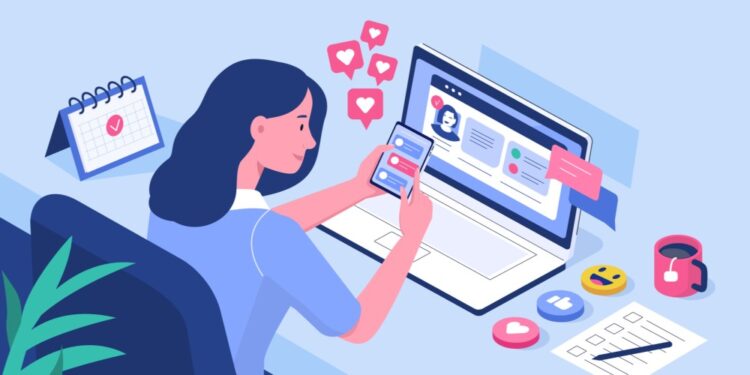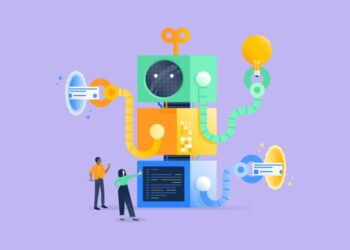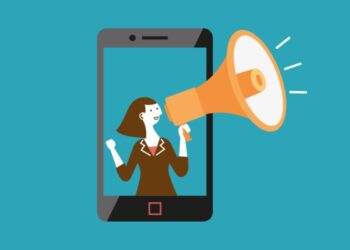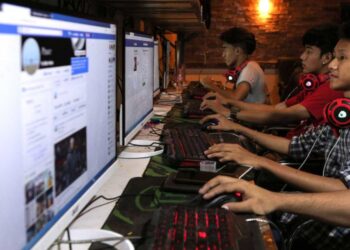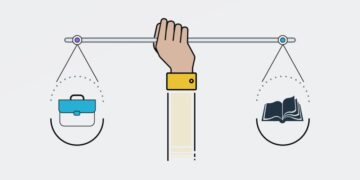Social media has undeniably become a defining aspect of the modern digital age, permeating nearly every corner of our personal and professional lives. As a result, its impact on individuals, societies, and the global landscape is both extensive and complex. Social media platforms have revolutionized communication, information dissemination, and social interactions, presenting unprecedented opportunities for connection and empowerment.
Yet, with its rapid proliferation, social media has also brought forth a myriad of challenges, from the spread of misinformation and online harassment to concerns about privacy and mental health. The advent of social media has fundamentally transformed how we communicate and interact with the world around us. It has broken down geographical barriers, allowing us to connect with people from diverse cultures and backgrounds in an instant.
Through the power of these platforms, news, ideas, and social movements can spread like wildfire, catalyzing social change and shaping public opinion in ways never before possible. However, the remarkable benefits of social media come hand in hand with complex drawbacks. The proliferation of misinformation and the rise of filter bubbles have led to polarized societies, where individuals are increasingly exposed only to information that aligns with their preexisting beliefs.
Moreover, social media’s pervasive nature has raised serious concerns about privacy, data security, and the ethical use of personal information by both corporations and governments. In this interconnected digital landscape, social media has not only reshaped how we conduct business, promote products, and engage with consumers but also how we navigate political landscapes, participate in democratic processes, and express our individual identities.
As social media influencers become digital celebrities, they wield immense influence over their followers, blurring the lines between marketing and authenticity. The impact of social media is felt most profoundly by younger generations, who have grown up immersed in this virtual world. As they grapple with issues of cyberbullying, self-esteem, and the commodification of personal lives, parents and educators face new challenges in nurturing their well-being and ensuring a safe digital environment.
As society grapples with the profound implications of social media, the need for responsible usage, ethical guidelines, and effective regulation becomes increasingly urgent. It is crucial to strike a balance between harnessing the transformative power of social media for positive change and mitigating its negative consequences. From the influence on democracy and political discourse to the implications for mental health and privacy, our understanding of social media’s profound influence will undoubtedly shape the path forward in the digital era.
Benefits of social media
Social media has become an integral part of modern life, transforming the way we communicate, share information, and interact with one another. While it has its share of challenges and drawbacks, there are also numerous benefits of using social media.
1. Enhanced connectivity
Social media platforms connect people across the globe, enabling individuals to establish and maintain relationships with friends, family, colleagues, and even strangers. This enhanced connectivity fosters a sense of community, breaking down geographical barriers and allowing people to stay in touch regardless of their physical location.
2. Information sharing and awareness
Social media serves as a powerful tool for disseminating information quickly and efficiently. News, updates, and trends spread rapidly through social networks, allowing users to stay informed about current events, social issues, scientific discoveries, and more. This helps raise awareness about critical matters on a global scale.
3. Networking and professional opportunities
Social media platforms like LinkedIn offer a platform for professionals to build their network, connect with potential employers, and discover job opportunities. Businesses can also leverage social media to connect with customers, expand their reach, and promote their products and services.
4. Education and learning
Social media has become an educational resource, with various platforms hosting groups and pages dedicated to specific topics, industries, or academic subjects. Users can access a vast amount of educational content, tutorials, and online courses, promoting lifelong learning.
5. Support and community building
Social media provides a space for people with shared interests, challenges, or experiences to come together and form supportive communities. This is especially valuable for individuals dealing with health issues, mental health concerns, or niche hobbies, as they can find like-minded individuals who understand and empathize with their situations.
6. Promotion of creativity and talent
Artists, writers, musicians, and other creative individuals can showcase their work on social media platforms, gaining exposure and building a following. Social media allows emerging talents to reach a broader audience, potentially leading to new opportunities and collaborations.
7. Political and social activism
Social media has played a crucial role in political movements and social activism. It empowers people to voice their opinions, organize protests, and raise awareness about various social and political issues. Activists can rally support, garner media attention, and catalyze positive change through social media campaigns.
8. Crisis communication and aid
During emergencies or natural disasters, social media has proven to be an essential tool for disseminating information, coordinating rescue efforts, and providing aid to affected communities. It enables individuals to reach out for help, and for organizations and authorities to coordinate relief efforts efficiently.
9. Entertainment and leisure
Social media offers a vast array of entertaining content, including funny videos, memes, inspirational stories, and other engaging posts. It serves as a source of leisure and relaxation, allowing users to unwind and de-stress after a long day.
10. Real-time customer feedback
Businesses can use social media to gather real-time feedback from their customers. This feedback helps them understand customer needs, preferences, and pain points, allowing for improvements to products and services. Additionally, it demonstrates a commitment to customer satisfaction and fosters a sense of transparency.
11. Global awareness and cultural exchange
Social media promotes cultural exchange by enabling users from different parts of the world to share their traditions, customs, and daily lives. It fosters mutual understanding and appreciation for diversity, breaking down stereotypes and promoting a global sense of interconnectedness.
12. Supporting small businesses and entrepreneurs
Social media levels the playing field for small businesses and entrepreneurs, offering them a cost-effective platform to reach a broader audience. It allows them to compete with more prominent brands, provided they use social media effectively to engage their target market.
13. Health and wellness communities
Social media provides platforms where individuals can connect with others who share similar health and wellness goals. Whether it’s fitness, healthy eating, or mental well-being, these communities offer support, motivation, and a sense of accountability.
14. Increased civic participation
Social media encourages civic participation by providing an accessible platform for discussions about public policies, elections, and social issues. It empowers citizens to voice their opinions, engage in debates, and stay involved in the democratic process.
15. Global branding and reputation management
Social media allows businesses and public figures to manage their brand image and reputation. It enables them to respond promptly to customer inquiries, address concerns, and showcase their values and corporate social responsibility initiatives.
Drawbacks of social media
Social media has become an integral part of modern society, revolutionizing the way people communicate, share information, and connect with each other. While there are undoubtedly numerous benefits to using social media, such as fostering global communication, providing instant access to news and events, and enabling networking opportunities, there are also significant drawbacks associated with its usage.
1. Addiction and time consumption
One of the most significant drawbacks of social media is its addictive nature. Social media platforms are designed to capture and retain users’ attention for extended periods, employing various tactics like infinite scrolling, personalized content, and notifications to keep users engaged. As a result, individuals can find themselves spending excessive amounts of time on social media, leading to a phenomenon known as “social media addiction.” This addiction can negatively impact productivity, focus, and real-life relationships, as users become increasingly preoccupied with virtual interactions at the expense of their daily responsibilities.
2. Mental health concerns
Social media usage has been associated with various mental health issues, particularly among adolescents and young adults. Studies have linked heavy social media use to increased rates of anxiety, depression, loneliness, and low self-esteem. Constantly comparing one’s life and achievements to others’ carefully curated and often idealized portrayals on social media can lead to feelings of inadequacy, known as “social comparison.” Additionally, cyberbullying and online harassment can further exacerbate mental health problems, as victims may experience distress, fear, and social isolation.
3. Privacy and data security
Privacy concerns are a prominent drawback of using social media platforms. Most social media companies collect vast amounts of user data, including personal information, location data, browsing habits, and social connections. This data is often used for targeted advertising, and in some cases, it can be shared with third-party entities without users’ explicit consent. Data breaches and incidents of unauthorized access can also compromise users’ sensitive information, leading to potential identity theft or other forms of misuse.
4. Spread of misinformation and fake news
Social media has become a breeding ground for the rapid dissemination of misinformation and fake news. Due to the ease of sharing content, false information can quickly go viral, leading to widespread confusion and distrust in reliable sources of information. The lack of fact-checking and the presence of echo chambers, where users are exposed only to information that aligns with their pre-existing beliefs, contribute to the amplification of false narratives and conspiracy theories.
5. Impact on real-life relationships
Excessive use of social media can have a negative impact on real-life relationships. With the majority of interactions occurring online, face-to-face communication and genuine connections may suffer. Constantly being engrossed in social media can lead to reduced quality time spent with friends and family, as well as miscommunication due to the lack of non-verbal cues and emotional expressions.
6. Public shaming and cancel culture
Social media can sometimes be a breeding ground for public shaming and “cancel culture.” When a person’s controversial or offensive actions are exposed on social media, it can lead to a rapid and intense backlash from the online community. While holding individuals accountable for their actions is essential, the unforgiving nature of cancel culture can have severe consequences, including reputational damage, mental distress, and even job loss.
7. Decreased attention span
The constant stream of information and short-form content on social media can contribute to a decrease in attention spans. Users are bombarded with a vast array of stimuli, leading to difficulties in sustaining focus and concentration on tasks that require deep thought or prolonged attention.
8. Impact on body image and self-esteem
Social media’s emphasis on appearance and image can have a detrimental impact on body image and self-esteem. The proliferation of filtered and edited photos, along with societal beauty standards perpetuated on social media, can lead to unrealistic expectations and dissatisfaction with one’s physical appearance.
9. Fear of Missing Out (FOMO)
The fear of missing out, commonly known as FOMO, is a psychological phenomenon exacerbated by social media. Seeing others’ exciting experiences, accomplishments, and social gatherings online can lead to feelings of envy and anxiety about missing out on similar opportunities.
10. Health issues and sleep disruption
The excessive use of social media, especially before bedtime, can lead to sleep disturbances. The blue light emitted by screens can interfere with the body’s natural sleep-wake cycle, leading to difficulties falling asleep and obtaining restful sleep. Sleep deprivation can have numerous negative effects on physical and mental health.
11. Escapism and comparison to unrealistic standards
Social media can become a form of escapism, where users seek refuge from their real-world problems and emotions in the virtual realm. However, this constant distraction can prevent individuals from addressing real-life challenges constructively. Moreover, comparing oneself to others’ highlight reels and unattainable standards can lead to feelings of inadequacy and dissatisfaction with one’s own life.
12. Censorship and suppression of free speech
While social media platforms aim to create safe online spaces, the enforcement of community guidelines and content policies can sometimes lead to concerns about censorship and suppression of free speech. Decisions about what content is allowed or removed can be subjective and may inadvertently stifle open dialogue and diverse perspectives.
13. Impact on children and adolescents
For young users, social media presents unique challenges. Exposure to age-inappropriate content, cyberbullying, and unrealistic portrayals of life can adversely affect the emotional and social development of children and adolescents. Moreover, excessive screen time on social media can lead to academic distractions and reduced time for physical activities and face-to-face social interactions.
Conclusion
The strong influence of social media on various industries, including marketing, entertainment, and news, has also powered its accessibility. Businesses, content creators, and news outlets have recognized the power of social media in reaching a wider audience and engaging with users. As a result, they have integrated social media into their strategies, ensuring that social media content is readily available and easily accessible across different platforms and mediums.
The benefits of using social media are vast and diverse. It has revolutionized communication, transformed the way we access information, and provided numerous opportunities for personal, professional, and societal growth. However, responsible and mindful usage is crucial to balance these advantages with the potential pitfalls of social media. While social media has undeniably transformed the way we interact and access information, it also comes with a range of significant drawbacks.
From addiction and mental health concerns to privacy issues and the spread of misinformation, users must approach social media with caution and mindfulness. Striking a healthy balance between virtual and real-life interactions, setting boundaries on usage, and critically evaluating the information encountered on social media are essential for minimizing the negative impacts and maximizing the potential benefits of these platforms.





















































































































































































